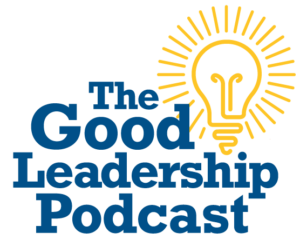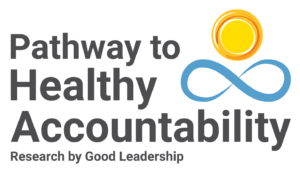

The Data Story from the Healthy Accountability Research
Paul Batz

Recently on the Good Leadership Podcast, Kevin Sensenig and I discuss the story behind the data from the Healthy Accountability Research Project. You can listen to that episode here.
This project began in February of 2024 because of a pain point causing suffering with many of our clients: accountability is getting really fuzzy. One CEO, after suffering an embarrassing and costly breakdown in accountability, asked the important question: How can we turn this crisis into a culture of Healthy Accountability?
The Need for Research
It’s a relevant question, because hundreds of books exist on the topic of accountability, but they often rely on intuition or anecdotal case studies of just one person. Few explore accountability using a rigorous methodology. I didn’t think that was good enough.
Perhaps the most important thing accomplished was a definition of Healthy Accountability:
Healthy Accountability is when people win together in an environment where individuals take personal ownership, embrace the support of the team, and deliver quality work on time.
Prior research uncovered a critical misconception: 84% of survey respondents believed accountability should rest primarily with managers. This caused Kevin and I to hypothesize that Healthy Accountability comes from strong interpersonal connections and managers who are skilled at building shared commitments. However, the research clearly shows that accountability doesn’t rest solely with the manager. The findings revealed that healthy accountability is a shared responsibility. It’s a system, not a 1-on-1 relationship.
That being said, Kevin explained the research highlights the importance of interpersonal connections and shared commitments. Managers play a vital role, but teammates who are direct peers have an even greater role in healthy accountability. Accountable teams create an environment where people feel safe asking for help and inviting feedback. It’s a more more effective approach, that employees label as “healthy.”
The Pathway to Accountability™
The Pathway to Healthy Accountability™ involves four key factors: two organizational and two team-oriented. On the organizational side, role modeling by senior leaders and selecting for accountability during hiring and promotion processes stood out. Teams, on the other hand, thrive when clear roles, responsibilities, and disciplined follow-through are present, alongside growth opportunities that allow them to seek accountability.
The research also debunks the myth that accountability issues are generational. In fact, 95% of people, regardless of age, care deeply about being accountable when they see how their work impacts the organization and receive opportunities for growth.
A New Framework for Leaders

The findings culminated in a framework symbolized by the infinity loop, which demonstrates the ongoing, interconnected nature of accountability. Leaders can foster this culture by being visible, planning priorities, and encouraging public reporting. Teams can strengthen accountability through regular communication loops and inspection cycles.
Healthy Accountability is about thriving together. When people own their outcomes, seek help, and invite feedback, that’s goodness.



